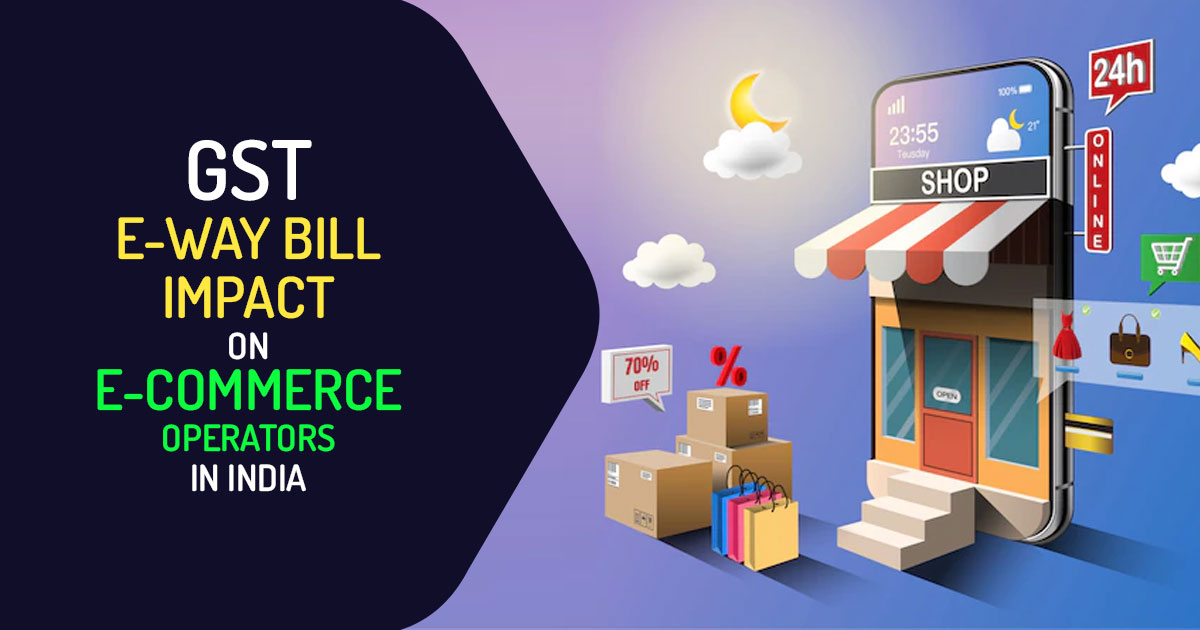
The way to run an e-Commerce industry will be effective through benchmarked logistics. To fulfil the need for transportation across states, eCommerce companies would lay on the logistic service providers to fulfil the need for transportation within the states. Customer satisfaction concerning the e-commerce business is been derived from logistics.
While some e-commerce firms handle their logistics by claiming services from traditional logistic partners, a bigger number are shifting toward building an in-house logistic system. See the impact of the e-way bill system on e-commerce operators.
What is an E-way Bill?
The e-way bill is an essential part of GST compliance. It is essential for the document to be generated prior to transporting it to another state. The e-way bill generation would be subjected to apply when the value of the goods is more than Rs 50,000. GST council made it mandatory for businesses to carry an e-way bill when transporting goods from state to state beneath compliance.
Effect of E-way Bill on E-Commerce Suppliers
The e-commerce business would have already arisen in the country and there is an extreme movement of goods from one state to other. The government, on realizing the volume of transactions in the industry have been ensured the applicability of the e-way bill on the goods transported by the e-commerce operators. There are some conditions imposed on e-commerce operators.
- If the intra-state movement of goods via roadways is tracked by an e-commerce operator or logistics company when the average value of the goods is below Rs 50,000 but the value of an individual consignment is less than ₹ 50,000.
- There is no need to issue information about the vehicle in the intra-state movement of goods this is under the condition that the distance covered during the transportation is 50 km or below. In the former time, the limit set was set to 10km.
Generation E-way Bill for E-Commerce Suppliers
Under the needs that the GST council meeting has made, an individual undertaking the consignment or in charge of the transportation should carry the mentioned documents:
- Delivery challan, invoice, or bill of supply
- E-way bill or E-way number inserted on the vehicle transporting the goods. That should be mapped to the Radio Frequency Identification Device (RFID).
The IRN or Invoice Reference number should be generated by uploading the tax invoice on the e-way bill portal. The IRC documents carry validity. The individual in charge might report carrying the physical copy of the bill of supply or the bill of entry.
E-way Bill Record and Transportation Verification
Ensuring that people just comply with the system rules, the council carries out the verification of documents and the conveyance. The verification might be carried out in the mentioned ways:
- Physical inspection: The commissioner might give the power to the authorized officer to intercept the conveyance. The transporter would be needed to present the physical copy of the e-way bill for the sake of verification, particularly for the movement of goods within several states. If the officer has the power then he might also conduct the examination of the goods in transit.
- Installation of RFID Readers: RFID readers are installed in the way to do the inspection. During the mapping of the e-way bill, the reader executes the verification automatically.
Read Also: GST E-way Bill for Job Work & Needed Documents to Send Goods
Examination Report of GST E-way Bill
Once the conveyance or the documents are inspected, a summary report should be provided by the inspection officer within 24 hours of the inspection. The same report would be needed to be recorded online. Another final report should be made and sent within 3 days of the inspection being conducted.
An inspection accomplished on the conveyance in one state does not execute a physical verification in the subsequent state. But the goods might be inspected again then the council obtains any information about the goods or theft of tax.
Under the GST rule, no vehicle could be reserved for inspection for more than 30 minutes if there is no true reason. If the same is the situation then the transporter would ask for the intervention of higher authorities by submitting a ‘Report of Detention’ in the GST-EWB-04.
The introduction of the e-way bill system has worked in streamlining the procedure of transporting goods from one state to another. E-commerce operations have been facilitated with the current revisions which are made by the GST committee.









